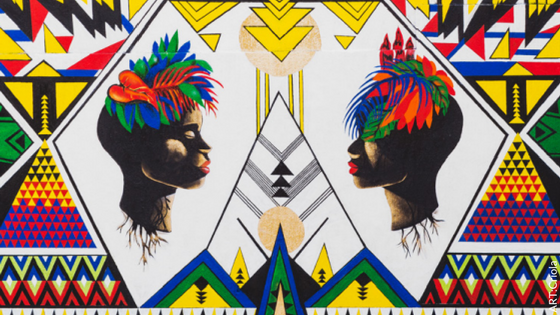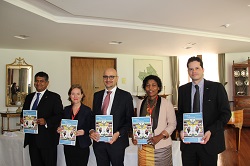What is the role of social protection policies in the promotion of women's empowerment?

Cover art: The selected piece depicts the graffiti art of Brazilian artist Criola, which is a celebration of Afro-Brazilian culture and women’s empowerment, reflecting the geographical and thematic focus of this issue.
Article by Denise Marinho dos Santos, Communications Officer
March, 2017—Women’s empowerment is paramount for the promotion of human development and inclusive growth, not to mention a basic human right. However, despite notable advances worldwide, no single country has fully achieved gender equality yet. Against this background, social protection policies have an important role in promoting gender equity and the inclusion of women in the economy, especially in developing countries. Addressing this important issue of the global development agenda, the International Policy Centre for Inclusive Growth (IPC-IG) launched a new special edition of its flagship publication, the Policy in Focus magazine, titled Social Protection: Towards Gender Equality. It covers key topics related to gender equality and social protection, featuring a wide range of contributions from women policy practitioners and scholars, presenting case studies and reflections from Brazil and various African countries.
To highlight the importance of the theme, the Centre, in partnership with the UK Embassy in Brazil and the UK Department for International Development (DFID), organised an event in Brasília on 7 March, to launch this special issue. The event also included representatives from the Brazilian Ministry of Foreign Affairs (MRE) and the Brazilian Cooperation Agency (ABC).

Raquel Tebaldi, IPC-IG researcher and co-editor of this special edition with Flora Myamba, says: "The magazine gathers articles and studies focusing on the contexts of social protection programmes currently under way in South Africa, Egypt, Uganda, Tanzania and Brazil. Some of the articles reflect on the challenges of pursuing gender equality through social policies, what can be improved and where can progress be seen".
Social protection has become prominent in the global development agenda over recent decades, with social protection systems now being included as a target under Sustainable Development Goal 1: “End poverty in all its forms everywhere”. In developing countries, these policies have played an important role in alleviating extreme poverty, among other impacts that are increasingly being investigated. Beyond the improvement of the material conditions of beneficiaries, measures that consider the power dynamics and inequalities within households and communities are needed for social protection programmes to properly address gender inequality in a transformative way.
This special issue seeks to promote a reflection on the issue of gender, starting with its very cover—a reproduction of the graffiti work by the Brazilian artist Criola, whose art is a celebration of Afro-Brazilian culture and feminine empowerment, reflecting the thematic and geographic focus of the magazine. The articles themselves provide a broad variety of experiences. Considering that the link between social protection and women’s empowerment must not be assumed automatically, Cristina Santos asks “Are we empowering women?” and presents an important reflection focusing on conditional cash transfers.
The article by Mildred Mushunje argues for a rights-based approach to addressing gender inequality via social protection and presents some of the main policy implications of this pursuit. These reflections are followed by country-specific studies, starting with a presentation of a recent assessment of the impacts of cash transfer programmes on women’s empowerment in Tanzania by Flora Myamba, which is followed by a piece by Rashida Shariff, regarding the barriers that Tanzanian women face to achieve leadership positions.
The issue of women’s leadership is also analysed by Florence Kyoheirwe Muhanguzi, in the context of non-state social protection governance in Uganda. Women’s relationships with the labour market, informality and social protection are also crucial areas of exploration, and Hania Sholkamy presents a compelling argument regarding the empowering potential of social protection—and cash transfers in particular—in the Egyptian context of highly unequal access to and participation in the labour market between men and women.
Sophie Plagerson, Lauren Stuart and Marianne Ulriksen reflect on the ways in which social protection programmes benefit women in the informal sector in South Africa. South–South cooperation provides great opportunities for mutual learning in gender-sensitive social protection. Raquel Tebaldi’s article focuses on an analysis of the potential of this cooperation between Brazil and African countries. The last two articles of this special edition focus on Brazil.
Janine Mello dos Santos explores the connections between the many facets of Brasil sem Miséria and gender equality, and presents important outcomes. Finishing on a personal note, Letícia Bartholo shares her experiences in the federal management of the Bolsa Família programme.
This special issue was produced in partnership with Research for Development (REPOA) and was prepared as part of the project: "Brazil & Africa: Fighting Poverty and Empowering Women via South-South Cooperation", financed DFID.